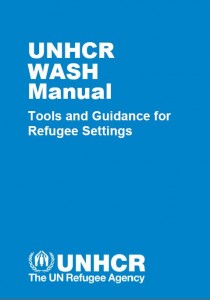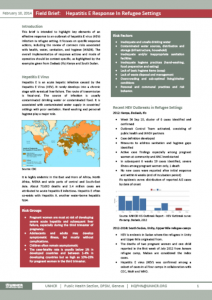
This brief is intended to highlight key elements of an effective response to an outbreak of hepatitis E virus (HEV) infection in refugee setting. It focuses on specific response actions, including the review of common risks associated with health, water, sanitation, and hygiene (WASH). The overall implementation of response actions and mode of operation should be context specific, as highlighted by the examples given from Dadaab (Ifo) Kenya and South Sudan.
Tags: Bulk Water Treatment, Excreta Management, Handwashing with Soap, Household Water Treatment, Hygiene Promotion, Public Health, Water Quality Testing and Surveillance, and Water Safety Plans. Locations: Africa, Dadaab, East and Horn of Africa, Kenya, South Sudan, and Sudan and Chad Special Operational Region. Languages: English. Organisations: UNHCR. Categories: WASH Emergency Guidelines, WASH Guidelines, WASH Operational Guidelines, WASH Policy Guidelines, and WASH Reference Documents.
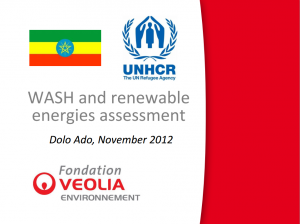
This document looks at drinking water, sanitation and renewable energy solutions and options in three camps in Dolo Odo with recommendations and conclusions.
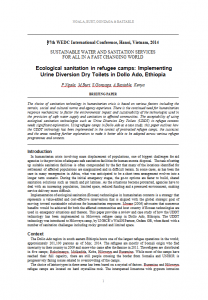
The choice of sanitation technology in humanitarian crisis is based on various factors including the terrain, social and cultural norms and agency experience. There is the continued need for humanitarian response mechanisms to factor the environmental impact and sustainability of the technologies used in the provision of safe water supply and sanitation to affected communities. The acceptability of using ecological sanitation technologies such as Urine Diversion Dry Toilets (UDDT) in refugee contexts needs significant exploration. Using refugee camps in Dollo Ado as a case study, this paper outlines how the UDDT technology has been implemented in the context of protracted refugee camps, the successes and the areas needing further exploration to make it better able to be adopted across various refugee programmes and contexts.
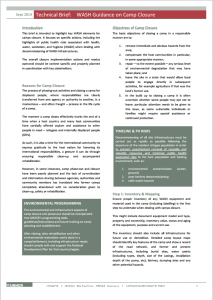
This brief is intended to highlight key WASH elements for camps closure. It focuses on specific actions, including the highlights of public health risks associated with health, water, sanitation, and hygiene (WASH) when dealing with decommissioning of WASH infrastructures. The overall closure implementation actions and modus operandi should be context specific and properly planned in coordination with key stakeholders.
Tags: Camp Closure, Cross Cutting, Environment, Excreta Management, Solid Waste Management, WASH Coordination, WASH Programme Health and Safety, WASH Programme Management, WASH Strategy Development, and Water Supply. Languages: English. Organisations: UNHCR. Categories: WASH Guidelines, WASH Operational Guidelines, WASH Policy Guidelines, and WASH Reference Documents.
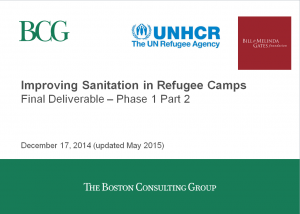
The report examines the feasibility of a wide range of standard sanitation technologies in addition to sanitation innovations in refugee contexts (including miniaturized biogas, reinvented toilets, new processor technologies, SMS dispatching, pay per use toilets, sale of by-products). Technologies were evaluated based on upfront investment cost; technology viability, suitable size and transportability; flexibility and resilience; and value for money.
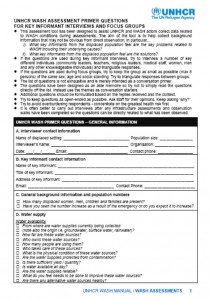
These WASH related primer questions have been designed to assist UNHCR and WASH actors collect data from key informants and focus groups during WASH assessments. The list of questions is not exhaustive and is merely intended as a conversation primer (aide memoire).
Tags: Excreta Management, Human Right to Water / Sanitation, Hygiene Promotion, Protection, Public Health, Solid Waste Management, WASH Assessments, WASH Monitoring, WASH Strategy Development, and Water Supply. Languages: English. Organisations: UNHCR. Categories: WASH Blank Forms, WASH Emergency Guidelines, WASH Emergency Tools, and WASH Reference Documents.
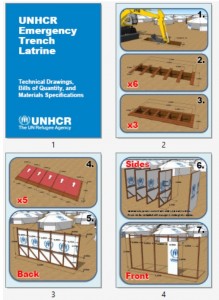
This document contains documentation to help UNHCR and WASH actors install emergency trench latrines in refugee settings. The package includes: Technical Drawings; Step by Step Construction Drawings; Bills of Quantity; Material and Workmanship Specifications; and Design Calculations.
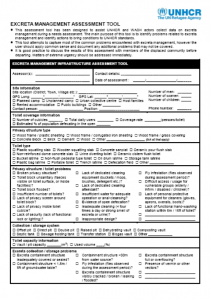
This assessment tool has been designed to assist UNHCR and WASH actors collect data on excreta management during a needs assessment. The main purpose of this tool is to identify problems related to excreta management and identify actions to bring conditions to UNHCR standards.
Tags: Communal Toilets, Desludging and Excreta Transportation, Excreta / Urine ReUse, Excreta Composting, Excreta Management, Excreta Treatment, Household Toilets, Sewerage and Excreta Conveyance, WASH Assessments, and WASH Monitoring. Languages: English. Organisations: UNHCR. Categories: WASH Blank Forms, WASH Emergency Guidelines, WASH Emergency Tools, and WASH Reference Documents.
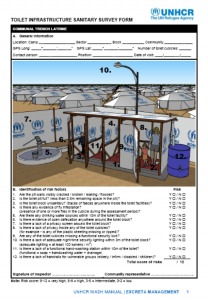
This sanitary survey form can be used to monitor and evaluate the condition of communal and public toilet blocks in a refugee setting. The main purpose of this tool is to rapidly identify public health and protection related risks. The tool can also be used in the medium term to monitor trends in the condition of toilet infrastructure.
 English
English










